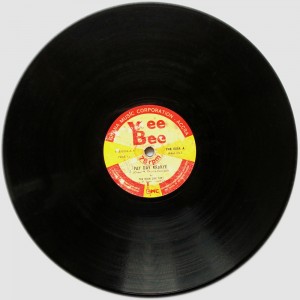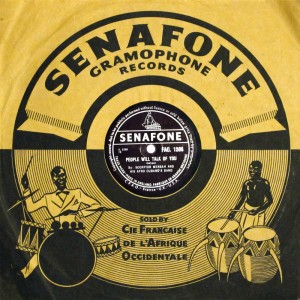The High Life Aces
YeeBee YBN 0004
“Payday Krakye” is a song about arrogance and extravagance. It is sung in the Twi language, and the singer (K. Bampoe) presents it from the point of view of either a colleague but rather an average, small Ghanaian without formal employment, addressing a gentleman (krakye), an employee blowing his salary on payday and taunting the average Ghanaian for travelling by trotro (a local mini-bus), eating low-cost food (yorkegali, a meal from gari and beans) and drinking locally distilled gin (akpeteshie). But the singer reminds our boastful “krakye” that by the middle of the month, his money will be gone if he continues his costly life style with rice dishes, beer and champagne… But besides the admonition to modesty, there is another aspect between the lines of this song: As the employee is just a gentleman after paydays but an average small man for the second half of the month, this is also a song about low wages, salaries to small to sustain a good life throughout the whole month.
“Payday Krakye” is a Highlife number written by Oscar More Ofori, one of Ghana’s most important composers and not only the leader of the High Life Aces but also the famous Broadway Dance Band, composer for King Bruce’s Black Beats and involved in numerous own projects such as Oscar’s Modern Rhythm Boys and Oscar & His Rhythm Group.
It was probably recorded in 1959 and released the same year on Yeebee, a local independent label of the late 1950s and early 60s, and even though its catalogue contained only a small number of titles, it nevertheless marked the beginning of a musical success story: It was the first label of Dick Essilfie-Bonzie, the man behind the famous Essiebons label.
Payday Krakye
Awo agye wo akotua nti, awo enya woho resrew’m o
Mere bo dadze, me reko ma kofa trotro
On the fifteenth beba, on the fifteenth beba, on the fifteenth beba
Ye nyinaa ye bofor trotro
Awo agye wo akotua nti, awo enya woho redzi mo
Mere bo dadze, me reko ma koto yorkegali
On the fifteenth beba, on the fifteenth beba, on the fifteenth beba
Ye nyinaa ye bedzi yorkegali
Awo agye wo ako tua nti, awo erenom beer
Mere bo dadze, me reko ma koto akpeteshie
On the fifteenth beba, on the fifteenth beba, on the fifteenth beba
Ye nyinaa ye bonom akpeteshie
Awo agye wo ako tua nti, enne erenom Champagne
Mere bo dadze o, mere koto yorkegali
On the fifteenth beba, on the fifteenth beba, on the fifteenth beba
Ye nyinaa ye bedzi yorkegali
Payday Gentleman
You got paid, so you tease me!
I will stick to the hard way*, I will go by trotro
On the coming fifteenth, on the coming fifteenth, on the coming fifteenth
We will both take trotro
You got paid, so you are feasting on rice
I will stick to the hard way, I will buy Yorkegali
On the coming fifteenth, on the coming fifteenth, on the coming fifteenth
We will both have Yorkegali
You got paid, so you grant yourself the luxury of drinking beer.
I will stick to the hard way, I will take humble Akpeteshie
On the coming fifteenth, on the coming fifteenth, on the coming fifteenth
We’ll both only have Akpeteshie
You got paid, so you indulge yourself drinking Champagne
I will stick to the hard way, I will have plain gari and beans
On the coming fifteenth, on the coming fifteenth, on the coming fifteenth
We will both have Yorkegali
* bo dadze: literally cracking metal


